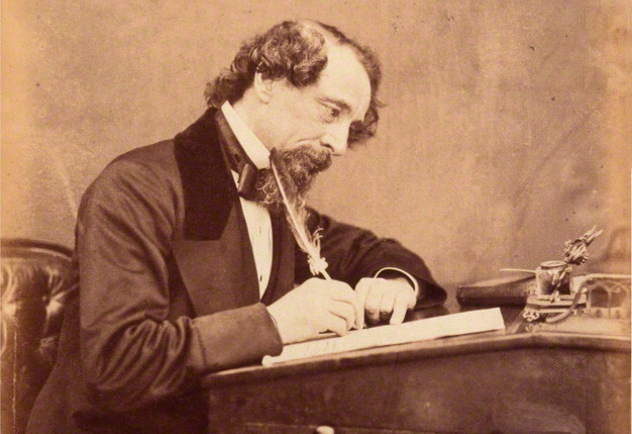 Technology
Technology  Technology
Technology  Humans
Humans 10 Everyday Human Behaviors That Are Actually Survival Instincts
 Animals
Animals 10 Animals That Humiliated and Harmed Historical Leaders
 History
History 10 Most Influential Protests in Modern History
 Creepy
Creepy 10 More Representations of Death from Myth, Legend, and Folktale
 Technology
Technology 10 Scientific Breakthroughs of 2025 That’ll Change Everything
 Our World
Our World 10 Ways Icelandic Culture Makes Other Countries Look Boring
 Misconceptions
Misconceptions 10 Common Misconceptions About the Victorian Era
 Mysteries
Mysteries 10 Strange Unexplained Mysteries of 2025
 Miscellaneous
Miscellaneous 10 of History’s Most Bell-Ringing Finishing Moves
 Technology
Technology Top 10 Everyday Tech Buzzwords That Hide a Darker Past
 Humans
Humans 10 Everyday Human Behaviors That Are Actually Survival Instincts
 Animals
Animals 10 Animals That Humiliated and Harmed Historical Leaders
Who's Behind Listverse?

Jamie Frater
Head Editor
Jamie founded Listverse due to an insatiable desire to share fascinating, obscure, and bizarre facts. He has been a guest speaker on numerous national radio and television stations and is a five time published author.
More About Us History
History 10 Most Influential Protests in Modern History
 Creepy
Creepy 10 More Representations of Death from Myth, Legend, and Folktale
 Technology
Technology 10 Scientific Breakthroughs of 2025 That’ll Change Everything
 Our World
Our World 10 Ways Icelandic Culture Makes Other Countries Look Boring
 Misconceptions
Misconceptions 10 Common Misconceptions About the Victorian Era
 Mysteries
Mysteries 10 Strange Unexplained Mysteries of 2025
 Miscellaneous
Miscellaneous 10 of History’s Most Bell-Ringing Finishing Moves
Ten Absolutely Vicious Fights over Inherited Fortunes
Money will forever be a topic of debate. Some claim it can buy happiness. Others argue the opposite. In reality, the impact of money on living the good life is (a little bit) more nuanced. For many, it depends on how it is acquired. Some people become wealthy through their professional success, hard work, or luck. Others have the privilege of growing up close to great wealth and merely must wait for the chance to inherit it.
That sounds like a good life, doesn’t it? Maybe, but inheritance can often be a very complicated process. The transfer of wealth from one generation to the next can lead to vicious disputes and awful tensions among heirs. After a rich person dies, family members can come out of the proverbial woodwork to compete for a share of the estate.
In some cases, these disputes can drag on for years or even decades. Through it all, there is no guarantee of a favorable outcome. Funds melt away as legal costs mount. Anger among surviving family members only gets more and more intense. For some ultra-wealthy people and their families, inherited fortunes can lead to these unexpected conflicts. In the worst cases, these long-lasting legal battles tear families apart.
In this list, you’ll learn about ten of the world’s most vicious and vindictive fights over inherited fortunes. These families battled brutally over billions of dollars—but in the end, did anybody really win?
Related: 10 Obscene And Ridiculous Things The Rich Do With Their Money
10 Sir Jacob Downing

The University of Cambridge in England is an esteemed academic institution. The world-renowned academy is made up of 31 colleges. Each one serves as a student’s home base, providing not only a place to live but also a unique community where they can form lifelong friendships. The creation of these colleges was often made possible through generous endowments from wealthy people.
Over the centuries before us, England’s richest people have chosen to leave their mark on the university, even giving generously to establish colleges. Their legacies remain today as benefactors of what has become one of the greatest universities in the world. But not all donations have come smoothly. In fact, some have been the subject of awful and complicated legal battles that have lasted for decades.
Take the story of Downing College, for one. The college was founded through a 17th-century bequest from English statesman Sir George Downing. However, it was not without its challenges. In the late 18th century, Sir Jacob Downing was the last living heir of Sir George. Jacob inherited a considerable fortune from the family, which he left to his wife upon his death in 1764.
The University of Cambridge sought to challenge the will, seeking money for George’s century-old donation. That kicked off a vicious 40-year-long legal battle. By the time the university finally won the case nearly four decades later, much of the money had been spent on legal fees. That left precious few funds remaining to actually build a college. However, the university pressed on with what little it earned from the legal battle. Finally, in 1820, Downing College welcomed its first students.[1]
9 Harinder Singh Brar

The Indian subcontinent was once home to numerous royal families who ruled over different parts of the country. For centuries, they dominated local politics and accumulated wealth. Today, they don’t hold the same power as they used to years before. However, many of these families still maintain significant assets passed down by earlier generations.
One such family was helmed by Sir Harinder Singh Brar. In his life, he had been the last of the former rulers of the Faridkot state. During his lifetime, he made multiple wills. Each one was also revised multiple times. At one point, he disinherited one of his daughters, only to later reconcile with her. When he died in 1989, the floodgates opened as the legal battle became vicious.
After Sir Harinder’s death, the formerly disinherited daughter, Amrit Kaur, expected to be in the newly revised will. However, at Sir Harinder’s inquest, a different will was read. It once again disinherited Amrit, who thought she had been aware of the most recent changes in her father’s post-mortem wishes. This led to a 31-year legal battle that began in 1991. It involved Kaur, her two sisters, an uncle, and a cousin.
After three decades, the case was finally settled in 2022 by the Indian Supreme Court. That governing body upheld a lower court’s ruling that the final will was a fake. A forensic expert stated that the handwriting and signatures in the supposed will were phony. During his life, Sir Harinder was well known for his impeccable and beautiful script. When the new “will” didn’t match, the courts were skeptical about its contents.
Kaur ended up staking her own fortune from the will’s outline. But suddenly, there were forgery battles to be fought, too. After the court’s ruling, Kaur filed a lawsuit against 23 people she believed were part of the forgery plot.[2]
8 Leona Helmsley
Longtime socialite Leona Helmsley was once infamously dubbed “The Queen of Mean.” She lived up to the reputation too. She and her husband had been successful in business and real estate. Over the years, she gained notoriety for her harsh treatment toward others—and for her frugality.
Her reputation reached new heights in 1988 when she was charged and convicted of tax evasion. One witness reported they heard Helmsley utter the infamous words, “We don’t pay taxes. Only the little people pay taxes.” But after serving time in prison, Helmsley became a dog lover. She eventually adopted a pooch named Trouble.
Upon her passing in 2007, Helmsley left Trouble with a $12 million inheritance. Her brother, tasked with caring for the dog, received another $10 million. Two of her supposedly beloved grandchildren were left with just $5 million each. However, her estate was valued between $4 billion and $8 billion. She ordered that the majority of her wealth be placed in a charitable trust. With the earmarked money meant for Trouble, the will soon faced several legal challenges.
Two of her grandchildren, who had been disinherited, successfully sued for $3 million each. Meanwhile, the executors sued for $100 million for their services—and won. A judge later knocked down Trouble’s inheritance take to a measly $2 million. Animal welfare groups even argued for a larger portion of the charitable trust and waged their own legal battles for it. Ultimately, the “Queen of Mean” left one lasting legal legacy after her torrid and tumultuous life.[3]
7 Peter Thellusson

The story of Peter Thellusson is a cautionary tale of what can happen when a wealthy person tries to control their wealth long after they die. Thellusson was an English merchant who managed to accumulate a vast fortune in his life. When he died in 1797, he wanted to ensure his wealth would continue to grow. More interestingly, he didn’t want his children or their children to be able to use any of it.
So he wrote a will that instructed his estate to be held in a trust. All interest on the estate would then be added to the total for decades on end. The idea was that the pile of money would grow until all his great-grandchildren were dead. Then, whoever remained several generations down the line would be able to inherit the fortune.
In the end, though, Thellusson’s plan backfired. Almost immediately, his surviving family was left in dire straits. In 1798, the court upheld his unusual will request and locked his money away. Nearly six decades later, all his great-grandchildren were finally dead. In 1856, a three-year court showdown kicked off. It centered on who exactly should inherit his money. However, there simply wasn’t any money to give! Court fees and taxes meant that hardly any money had accumulated over the years. Thus, Thellusson’s idea of handing his fortune to a descendant he’d never met proved to be an unimaginable dud.
In fact, Thellusson’s will war is so extraordinary that it actually led to a change in English law. Politicians wanted to make sure that such a thing could never happen again. So in the 19th century, the “Thellusson Act” was signed into law. It was meant to prevent people from withholding inheritable assets from family members in a similar way in the future.[4]
6 Jay Pritzker
Jay Pritzker was the founder of hundreds of businesses, including, most notably, the Hyatt hotel chain. In his life, he amassed a significant fortune. But when he died in 2001, it all unraveled—both in court and across public opinion. Despite his wealth, the Pritzker family has previously preferred to stay out of the public eye. But this changed in 2003 when Liesel Pritzker, a 19-year-old niece of the family, took her father and cousins to court over the inheritance. She claimed that $1 billion was stolen from the trust fund for her and her brother. Then, she claimed, they were supposedly kept out of a secret agreement to sell off the family’s companies.
The legal battle divided the family for years. Even more notably, it put their private affairs on public display. Soon, the situation became especially unpleasant for most of the extended family—especially sons Anthony and Jay Robert Pritzker. After two years of court proceedings, the family finally reached a settlement with Liesel and her brother.
The young pair received roughly $560 million to walk away from it all. Not all family members were on board with that pay-off, but the settlement brought closure to the matter. More importantly, for some of the notoriously private Pritzkers, it allowed them to return to a relatively anonymous life away from prying media eyes.[5]
5 William Jennens

The case of William Jennens, an Englishman who died in 1798, may be one of the most intriguing and complicated inheritance battles in history. Jennens was widely known as the richest commoner in England during his life. He had a fortune estimated at over two million pounds sterling. However, he died without a will. So he left behind a legacy that was up for grabs.
This led to a frenzy of people from all over the world claiming to be related to Jennens. Of course, they were hoping to stake their claim to his fortune. And it nearly worked! The confusion surrounding Jennens’s own uncertain parentage only fueled the fire. Quickly, it made the battle over his inheritance even more complicated.
The legal battle over Jennens’s inheritance lasted for over a century in total. It was so dramatic that it is believed to have served as the inspiration for Charles Dickens’s novel Bleak House. Ultimately, the lawyers took the lion’s share of the fortune. To that end, the case of William Jennens remains a cautionary tale about the dangers of dying without a will.
Whatever incredible wealth he accumulated in his wife was nearly completely wiped out in attorney’s fees. Those hoping to cash in saw it as a waste, but there was little to be done. Consider it a lesson to the most successful among us to hash out a will should the worst happen![6]
4 John Seward Johnson
John Seward Johnson was a well-known figure due to his association with the Johnson & Johnson company. He was married to his wife Essie for over three decades and seemed destined to live out a charmed existence. But his life took a scandalous turn when he set his eyes on a new employee. She was a 30-year-old Polish immigrant named Basia Piasecka. And despite the 40-year age difference and the controversial beginning, the couple remained together until Seward’s death in 1983. That’s when the drama really began for Seward’s children and his massive estate.
Upon the magnate’s death, his six children were shocked to discover he had left almost all his half-a-billion dollar estate to the former maid. They took her to court, claiming she took advantage of Seward’s age and mental state. But Basia was ready to fight back. She claimed that their marriage had been happy. It was the stepchildren, she asserted, who were only after the late mogul’s money.0
The case went to trial in 1986 and lasted for four months. However, right before the verdict was to be delivered, Basia changed her mind and agreed to a settlement. She walked away with over $300 million. The rest of the money was divided up between the children and the charity.[7]
3 Nina Wang
Nina Wang was a woman of contradictions. She was known as “Little Sweetie.” She was one of the richest people in the world at the turn of the millennium. But despite her immense wealth, she lived frugally. And she had a childlike air about her, wearing pigtails, miniskirts, and ankle socks well into her 60s.
Her husband, Teddy Wang, had been an extraordinarily wealthy businessman. He was kidnapped twice during his life. The second time resulted in tragedy after a ransom was not paid quickly enough to secure his release. The shocking disappearance of Teddy resulted in a legal battle over his fortune. At one point, Nina was jailed for forgery regarding that inheritance. But finally, she did receive the value of his estate.
Then, Nina’s death in 2006 led to a second legal battle. That time, her $4 billion fortune went up for grabs. Her married younger lover Tony Chan claimed to be the sole beneficiary of her will. However, the validity of that will was called into question by Nina’s family. The result led to a lengthy court battle. It drew large crowds across China and the rest of Asia eager to snoop on the sordid details of their relationship.
The court eventually ruled that Nina’s will had indeed been a forgery. In truth, they found Nina actually left her fortune to charity. In 2012, Tony was sentenced to 12 years in prison for forging the will. Today, Nina will forever be remembered as the quirky rich woman at the center of two massive and vindictive inheritance fights.[8]
2 Fred Koch
Fred Koch was an American oil magnate in the mid-20th century. He had four sons who were involved in the family business, Koch Industries. Upon his death, Fred left instructions for his sons to be kind to one another. Unfortunately, that didn’t happen. The siblings had intense rivalries and fought for control of the company after their father’s passing in 1967. The inheritance was all tied up in the lucrative family business.
In time, brothers Charles and David bought out their other brothers, Bill and Frederick, for over $1 billion. Charles and David recognized that the value of the oil-related business was exceptionally high. Of course, a nine-figure payday is nothing to dismiss—but that’s exactly what happened.
Over the years, Bill and Frederick felt the $700 million compensation from their other two brothers had actually been unfairly low. So they spent the next two decades in court trying to win back more money. It caused a rift between the two pairs of brothers that lasted all of 18 years. It even went on all the way through their mother’s funeral.
As it turned out later, their mother had even cut Bill and Frederick out of her own will in response to the ongoing lawsuit. The legal battle finally ended for good in 1998 when Bill and Frederick lost their claim for more money. Based on the final determination of the case, the two brothers were just going to have to settle for $700 million and make do with that.[9]
9 J. Howard Marshall
You didn’t think we were going to forget the most infamous case of an inheritance gone wrong, did you? Anna Nicole Smith was a well-known model and dancer when she met billionaire J. Howard Marshall in a gentlemen’s club in 1991. The two of them married three years later. The marriage immediately raised questions among Marshall’s family, as Anna was 26 years old, and the billionaire was 89.
Sadly, Howard passed away a year after their marriage. With his death, the vicious and bizarre battle for his inheritance began. The problem from the start was that Howard had not included Anna in his will. He didn’t include his son Howard in the will, either, bequeathing money only to his other son. Pierce. So the table was set for a vicious courtroom showdown.
The battle between Anna and Pierce quickly became intense. It was a media delight filled with twists and turns. Pierce claimed that 13 legal documents proved that he was the rightful heir. Meanwhile, Anna argued her late husband had promised to leave her half of everything when he was alive. The case was a media circus for years. It saw conflicting decisions from a Texas state court and a California bankruptcy court. It even reached the Supreme Court, which merely ruled that Anna could keep fighting for the inheritance.
Tragically, both Anna and Pierce died in quick succession in the mid-2000s. However, the case continued as Smith’s daughter became the potential heir in line for the fortune. By the mid-2010s, courts ruled against Smith’s estate in favor of Marshall’s family. Then, in 2017, the judge who had heard the entirety of the probate case was begging to be removed from it. You know a case has gone too long when the judge begs the parties not to show up anymore![10]








